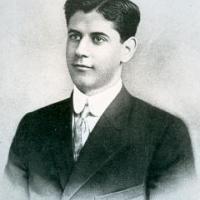
Bogoljubow-Capablanca, Bad Kissingen 1928
José Raúl Capablanca Y Graupera was born in Cuba on November 19, 1888 and died March 8, 1942. He was a great chess prodigy who learned the game by watching at the age of four. He was the game's greatest natural talent and one of the greatest players ever. He burst on the international scene in 1911 and was quickly regarded as the world's best player, especially at speed chess. In his prime he was known as the Chess Machine. In 1921, he won the world championship from Emanuel Lasker and became the first to ever win that title without losing a game. That was not done again until Kramnik defeated Kasparov in 2000. Capablanca lost his title in 1927 to Alexander Alekhine, another all time great. Alekhine did not give Capablanca a return match and avoided playing in the same event with him many times. In the following game, Capablanca meets Efim Bogoljubow (spelling varies). Bogoljubow was born April 14, 1889 and died June 18, 1952. The game was played at Bad Kissingen 1928. Bogoljubow had been speaking of Capablanca declining as a player. It is true that Capa had lost his title and had said that he had peaked in 1919. It is true that Bogojubow won the tournament with 6 wins, four draws, and one loss for a score of 8-3, while Capa had 4 wins, 6 draws, and one loss for a score of 7-4. Capablanca's score was good for clear second in the event that included 12 great players, with Alekhine and Lasker absent. It is also true that Bogoljubow's loss was to Capablanca. It is also true that Alekhine, while avoiding Capablanca, played two matches for the title with Bogoljubow, in 1929 and 1934. Alekhine then played Max Euwe and lost his title, but won it back in a return match. Capablanca was never given that chance, after all, Alekhine, when asked to explain how he won the title from Capablanca, was only to say he did not know. Others say Alekhine worked hard and Capablanca was too sure of himself in general and had previously dominated Alekhine. The opening in the game was a Queen's Indian Defense. The variation used was to provide Capablanca several wins. As usual, there are game references and original analysis.



